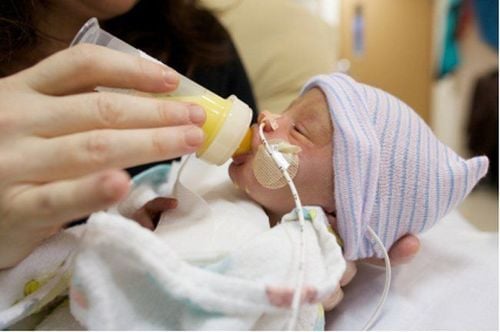This is an automatically translated article.
How to care for a premature baby is a challenging issue, with many difficulties from being in the intensive care unit until going home. Nutritional issues for premature infants include early, divided and continuous feedings to absorb the amount of milk needed to catch up with growth as a full-term infant.
1. Nutritional characteristics for premature babies
Premature babies are small and may not be able to take milk right away. In fact, babies born prematurely, between 34 and 37 weeks, often have trouble bottle-feeding or breast-feeding. This is because babies are not mature enough to coordinate sucking, breathing and swallowing movements.
Therefore, preterm infant nutrition is not always easy to follow but is very important for the development and growth of the baby. A good diet not only helps the baby's body to develop normally, but also the brain development is not affected because of premature birth.
Other conditions that can also interfere with a premature baby's ability to suck by mouth include:
Breathing problems; Low oxygen levels; Circulatory system function Blood infection . As such, if the infant is very small or sick, he or she may need to be given nutrients and fluids through a vein. As babies get better, nutrition for premature babies can get breast milk or formula through a tube into the stomach through the nose or mouth. The amount of breast milk or formula is increased very slowly from day to day, especially for very premature babies. This reduces the risk of an intestinal infection called necrotizing enterocolitis in infants. At the same time, if premature infants are breastfed, they are less likely to develop necrotizing enterocolitis.
For the group of premature babies between 34 and 37 weeks of age can usually be bottle-fed or breast-fed. Premature babies can breastfeed more easily than bottle-fed at first. This is because the flow from the bottle is more difficult to control and the baby may choke or stop breathing. However, babies can also have problems maintaining proper suction at the breast to get enough milk to meet their needs.

Chăm sóc dinh dưỡng cho trẻ sinh non thông qua ống dẫn đến dạ dày
2. Why do we need special nutrition for premature babies?
Premature babies have more difficulty maintaining enough energy, proper water balance in the body. Accordingly, these children can quickly run out of energy, lack or excess water because it takes a lot of effort to breathe.
Even so, breast milk is still the best source of nutrition for premature babies, especially for premature babies and low birth weight babies. The benefit of breast milk is that it may protect infants against infections and sudden infant death syndrome, necrotizing enterocolitis.
If the mother does not have enough milk, special formulas for premature babies can also be used. These formulas often have extra calcium and protein to meet the growth needs of premature babies. For large premature babies (gestational age 34-36 weeks) can be switched to regular formula or transitional formula.
However, babies born prematurely because they have not been in the womb long enough to store the necessary nutrients, so they must take some supplements. Accordingly, breastfed babies may need a supplement to provide additional protein, calories, iron, calcium, and vitamins. Formula-fed babies may need a number of additional nutrients, including vitamins A, C, D and folic acid.
Most premature babies will need continued nutritional supplementation after discharge from the hospital. Breastfed babies need iron and vitamin D supplements. Some babies will need more than others if they can't get enough milk through breastfeeding.
3. How much milk is needed to take care of a premature baby?
To determine how much milk to give a premature baby at home, parents should ask the neonatal intensive care unit (NICU) staff how much their baby can eat in the hospital. This is the minimum amount of base milk as a measure for parents to continue to care for their premature baby at home.
In fact, most breastfed babies feed about 8 to 12 times per day (about every 90 minutes to 3 hours), about 45 to 90 ml of milk every 2 to 3 hours.
No matter what premature babies eat, formula or breast milk, they get the nutrition they need if they make sure they're getting enough. If the baby is not getting enough milk, the baby will show signs of dehydration, such as:
Crying without tears; Dry mouth, tongue and skin; Change less than six wet diapers in a 24-hour period; Sunken eyes; Sunken fontanelle. It is important for parents to remember scheduled follow-up visits with their pediatrician. Children's length, weight and head growth will be measured at each periodic health check to assess growth.

Dinh dưỡng cho trẻ sinh non cần quan tâm đến lượng sữa cho trẻ ăn
4. How to take care of premature babies at home?
At home, if your baby is taking less milk than at the hospital or seems to be growing poorly, consult your pediatrician. In addition, whether your baby is breastfed or bottle-fed, the following tips can encourage your baby to eat more:
Feed your baby as soon as he or she is hungry: Crying is a late sign of hunger. If your baby is sucking his fist or straining, feed him. Babies may feed better or more milk if they are fed as soon as they start showing signs of hunger. Make sure your baby is fully awake: If your baby tends to fall asleep during feedings, try to keep him awake and interested. After each feeding, hold the baby along and pat him on the back. Avoid putting the baby down too soon, it can lead to gastroesophageal reflux. In short, with a complete diet, premature babies will have good conditions to continue to develop. The above certain insights will help parents answer worries and concerns about what premature babies eat or how to take care of premature babies to build a solid start for their children like other children of the same age. age.
Please dial HOTLINE for more information or register for an appointment HERE. Download MyVinmec app to make appointments faster and to manage your bookings easily.
References: ncbi.nlm.nih.gov, verywellfamily.com, medlineplus.gov












